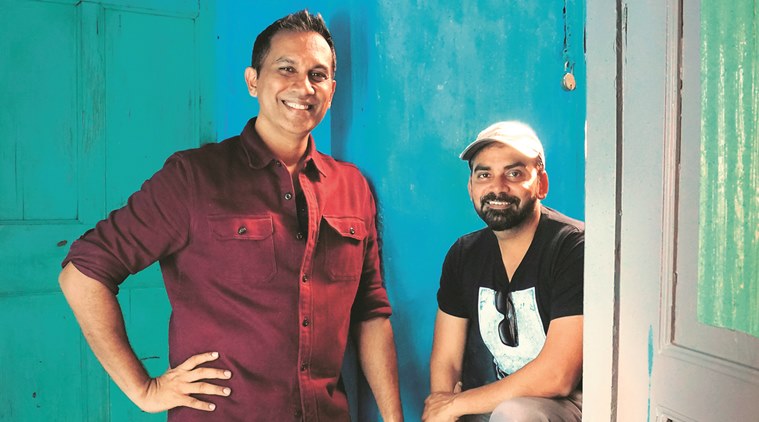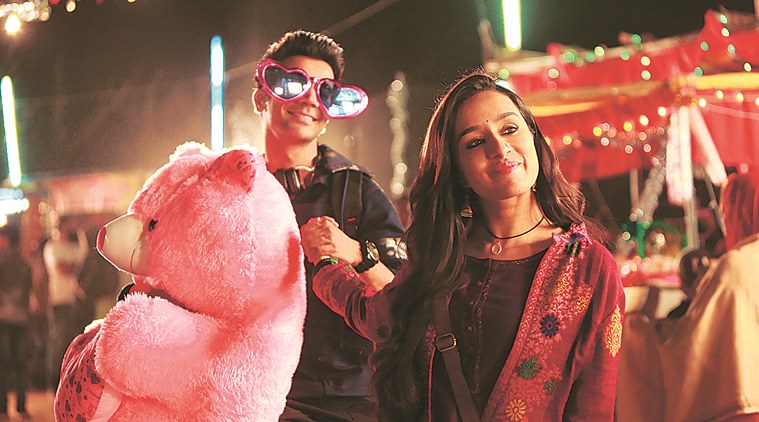 Raj Nidimoru (left) with Krishna DK
Raj Nidimoru (left) with Krishna DK
One half of Stree’s writing team, Raj Nidimoru talks about why they chose to subvert patriarchy through a horror comedy
How did you arrive at a point where you wanted to subvert patriarchy through a horror comedy?
The feminist angle wasn’t conscious. We just wanted to tell a horror story without taking a tried-and-tested path. It started from an incident in my hometown Tirupati. We were going around town on a bike during Shivratri when we saw these texts on the wall saying, ‘Stree kal aana’. When we inquired, we were told it’s a mad woman who beats up people. Someone else said she doesn’t have a head. Another told us she steals babies. I filed it away in my head as something ridiculous. But later, I thought, ‘What if this was for real? What if she doesn’t steal babies but targets men?’. It occurred to us that there is so much subtext to this story. We started calling her ‘stree’— not ‘chudail’ or ‘pisaach’. That changed our course completely. The reality can be stark and women go through it every day. Someone steps out to shop for groceries and you can never be sure she will return home. Turning the gender concept on its head also made it funny. A predator is out there and this time, it’s a woman. In the film, a man steps out to urinate and the fear is that all there will be left of him are his clothes. In such case, how would a man feel? But unlike men, you ask her to go and she does, she also seeks consent.
You merge horror with comedy. Was that an attempt to make the genre more palatable to a larger audience?
We have never been the kind who can stick to defined genres, like love story or slice-of-life. So that was part of the reason but yes, horror is more palatable with humour. Those who enjoy horror may not find it spooky enough. But this film works as a good primer for all those who don’t like horror films and would never go for one. We wanted to make a roller coaster ride that people enjoy and not one they never want to take again.
 A still from Stree
A still from Stree
But humour is also a part of your style. Go Goa Gone, too, was a zombie-comedy.
I view Go Goa Gone as a slacker comedy — three slackers amid nature. The obvious way would have been to have them attend a party where something goes wrong. We just pushed the envelope by reimagining that in the zombie space. Similarly, in Stree, you expect the movie to be a sweet little love story in a small town. We added an element of bizzare — it could have well been Thor’s hammer falling from the sky — and now we write it imagining how the characters would deal with it.
Why make the hero Vicky’s (Rajkummar Rao) mother a tawaif?
It’s a stereotype of a mother we wanted to play with. People are not defined by who their parents were or what they did for a living. This one was, in fact, one of my favourite victories in the film — the fact that my hero is the son of a prostitute who saves everyone’s lives. It’s about saying, ‘Let’s not judge people’.
At the end, the village places the plaque saying ‘O stree, raksha karna’ (Please protect us, Stree). Why the burden of deification on women?
It’s more about giving Stree what’s been missing so far — respect. It wasn’t so much about attaching the role of a protector but it went with the language we were using. Saying, ‘O stree hum tumhari izzat karte hain’ would have been out of place.
Doesn’t an item song in the film taking a stand for women seem out of place?
That’s our mistake. We were in two minds but we fell for the marketing ploy. A launda dance would not have been out of place in a small town during a festival but where we went wrong was in the way it was picturised. It’s something we won’t do anymore.
Your co-writer and co-director DK is away shooting a web series and you join him soon. What is that one about?
The Family Man is a thriller-drama set against the backdrop of counter-terrorism. The satirical humour comes from our system. In one line, we are calling it ‘Middle class guy, world class spy’. Through this narrative, we explore the sociopolitical issues.